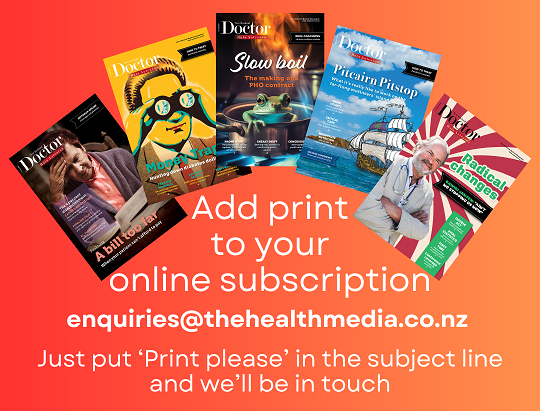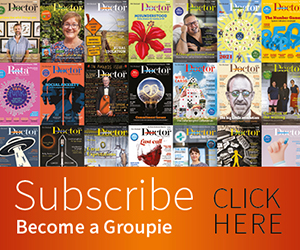Respiratory physician Lutz Beckert considers chronic obstructive pulmonary disease management, including the prevention of COPD, the importance of smoking cessation and pulmonary rehabilitation, and the lifesaving potential of addressing treatable traits. He also discusses the logic of inhaler therapy, moving from single therapy to dual and triple therapy when indicated, as well as other aspects of management
Noooo, not the tea and toast
Noooo, not the tea and toast

A PR disaster highlights public discontent, raising questions about what we want from our health system as it faces growing strife and an AI-driven future, writes editor Barbara Fountain
The health sector has had a harsh winter, and just as it was about to tip into spring, the fates dealt a farewell chilling blow
The health sector has had a harsh winter, and just as it was about to tip into spring, the fates dealt a farewell chilling blow.
On 31 August, the news broke that new mothers would no longer be able to enjoy a post-delivery cup of tea and toast at Wellington Regional Hospital.
Whether it was cost-cutting or a nutritional rethink (as was the official line), this little deprivation in the vast swathes of cuts affecting the health system and its inhabitants was a final insult.
Even the most junior communications staffer at Te Whatu Ora would have been holding their head in their hands, quietly mumbling, “No, no, no, no, no,” seeing Toastgate for the PR disaster it was.
Is there anything as sacrosanct than that cup of tea and slice of toast to aid recovery when hit with the realisation that all the talk of control and breathing, the candles and the music, the dolphins – whatever – was a smokescreen for the true brutality of childbirth? Once you get through that sucker, well, if there’s nothing stronger available, then I’ll take your tea and toast, thank you very much – and lots of sugar while you’re there.
But tea and toast were only off the menu for as long as it took to say, “We do love new mothers, really.” It was a small triumph for a system needing a few more wins.
It’s been looking particularly bleak lately for general practice with a swathe of news stories in the general media highlighting the issues we’ve been covering here at New Zealand Doctor Rata Aotearoa for years.
For the record, it is good news that the challenges facing general practice and its owners and staff are making headlines. The news may not be good in itself; we’ve heard it all before – staff shortages, burnout and frustrated patients – but now it has reached the public consciousness.
That line on the graph representing retiring GPs, only slightly ahead of the one signalling retiring practice nurses, is now in the public psyche.
Everyone knows general practice has a problem, the country has a problem, and health minister Shane Reti has a problem. Dr Reti tells the general media he is reviewing the model, the funding, the training, or any number of things, but general practice has heard this before.
The problem with greater public knowledge, not only of the issue locally but worldwide, is a certain fatalism – if it’s a problem overseas, how can we manage to fix it here?
We see patients queuing for hours for a consultation at a Very Low Cost Access walk-in practice in Auckland; in the UK, a survey commissioned by political party the Liberal Democrats finds almost one in three people surveyed who needed to visit an A&E decided instead to treat themselves rather than endure the long wait for treatment.

For someone who grew up with “just give it a good rub” for bones twisted or “put some spit on it” for grazes, DIY slings, wound care and self-medication do not immediately sound alarm bells, but still I know it's not good.
Alongside the fatalism, there is also a new freedom. Practices that might have boxed on despite the odds are now admitting to their limits, and the reluctance to raise fees is being put to one side in favour of retaining staff and viability.
But counter to this is a sense of giving up on the general practice specialty; telehealth steps in as a solution when it is, in fact, only a tool. We see the scopes of other health workers “massaged” in ways that do not appear wellthought-through and essentially divert resources from other areas of health. It also sees conflict between professionals distracting from the bigger picture.
At the same time, we are on the cusp of an AI revolution in medicine. It is still hard to grasp the impact it will have, but suffice it to say, it will free up GP time to…see another patient?
At that point, we need to pull back and ask what we really want from the health system – responsible for only about 20 per cent of our wellbeing. As the Government slashes spending on walkways and cycleways, cuts itself out of an agreement on infant formula standards, reduces access to services for people with disabilities and ditches the promise of a smoke-free future, the problems for the “health” system continue to amplify.
But will AI truly understand the wonder of gumboot tea and cold toast?
TELL US WHAT YOU THINK
Send a Letter to the Editor to editor@nzdoctor.co.nz
We're publishing this article as a FREE READ so it is FREE to read and EASY to share more widely. Please support us and our journalism – subscribe here
One of the benefits of subscribing is you will also be able to share your thoughts about what you read with others in our Comment Stream. You can also take notes on what you read with Capture








![Barbara Fountain, editor of New Zealand Doctor Rata Aotearoa, and Paul Hutchison, GP and senior medical clinician at Tāmaki Health [Image: Simon Maude]](/sites/default/files/styles/thumbnail_cropped_100/public/2025-03/Barbara%20Fountain%2C%20editor%20of%20New%20Zealand%20Doctor%20Rata%20Aotearoa%2C%20and%20Paul%20Hutchison%2C%20GP%20and%20senior%20medical%20clinician%20at%20T%C4%81maki%20Health%20CR%20Simon%20Maude.jpg?itok=-HbQ1EYA)
![Lori Peters, NP and advanced health improvement practitioner at Mahitahi Hauora, and Jasper Nacilla, NP at The Terrace Medical Centre in Wellington [Image: Simon Maude]](/sites/default/files/styles/thumbnail_cropped_100/public/2025-03/2.%20Lori%20Peters%2C%20NP%20and%20advanced%20HIP%20at%20Mahitahi%20Hauora%2C%20and%20Jasper%20Nacilla%2C%20NP%20at%20The%20Terrace%20Medical%20Centre%20in%20Wellington%20CR%20Simon%20Maude.jpg?itok=sUfbsSF1)
![Ministry of Social Development health and disability coordinator Liz Williams, regional health advisors Mary Mojel and Larah Takarangi, and health and disability coordinators Rebecca Staunton and Myint Than Htut [Image: Simon Maude]](/sites/default/files/styles/thumbnail_cropped_100/public/2025-03/3.%20Ministry%20of%20Social%20Development%27s%20Liz%20Williams%2C%20Mary%20Mojel%2C%20Larah%20Takarangi%2C%20Rebecca%20Staunton%20and%20Myint%20Than%20Htut%20CR%20Simon%20Maude.jpg?itok=9ceOujzC)
![Locum GP Helen Fisher, with Te Kuiti Medical Centre NP Bridget Woodney [Image: Simon Maude]](/sites/default/files/styles/thumbnail_cropped_100/public/2025-03/4.%20Locum%20GP%20Helen%20Fisher%2C%20with%20Te%20Kuiti%20Medical%20Centre%20NP%20Bridget%20Woodney%20CR%20Simon%20Maude.jpg?itok=TJeODetm)
![Ruby Faulkner, GPEP2, with David Small, GPEP3 from The Doctors Greenmeadows in Napier [Image: Simon Maude]](/sites/default/files/styles/thumbnail_cropped_100/public/2025-03/5.%20Ruby%20Faulkner%2C%20GPEP2%2C%20with%20David%20Small%2C%20GPEP3%20from%20The%20Doctors%20Greenmeadows%20in%20Napier%20CR%20Simon%20Maude.jpg?itok=B0u4wsIs)
![Rochelle Langton and Libby Thomas, marketing advisors at the Medical Protection Society [Image: Simon Maude]](/sites/default/files/styles/thumbnail_cropped_100/public/2025-03/6.%20Rochelle%20Langton%20and%20Libby%20Thomas%2C%20marketing%20advisors%20at%20the%20Medical%20Protection%20Society%20CR%20Simon%20Maude.jpg?itok=r52_Cf74)
![Specialist GP Lucy Gibberd, medical advisor at MPS, and Zara Bolam, urgent-care specialist at The Nest Health Centre in Inglewood [Image: Simon Maude]](/sites/default/files/styles/thumbnail_cropped_100/public/2025-03/7.%20Specialist%20GP%20Lucy%20Gibberd%2C%20medical%20advisor%20at%20MPS%2C%20and%20Zara%20Bolam%2C%20urgent-care%20specialist%20at%20The%20Nest%20Health%20Centre%20in%20Inglewood%20CR%20Simon%20Maude.jpg?itok=z8eVoBU3)
![Olivia Blackmore and Trudee Sharp, NPs at Gore Health Centre, and Gaylene Hastie, NP at Queenstown Medical Centre [Image: Simon Maude]](/sites/default/files/styles/thumbnail_cropped_100/public/2025-03/8.%20Olivia%20Blackmore%20and%20Trudee%20Sharp%2C%20NPs%20at%20Gore%20Health%20Centre%2C%20and%20Gaylene%20Hastie%2C%20NP%20at%20Queenstown%20Medical%20Centre%20CR%20Simon%20Maude.jpg?itok=Z6u9d0XH)
![Mary Toloa, specialist GP at Porirua and Union Community Health Service in Wellington, Mara Coler, clinical pharmacist at Tū Ora Compass Health, and Bhavna Mistry, specialist GP at Porirua and Union Community Health Service [Image: Simon Maude]](/sites/default/files/styles/thumbnail_cropped_100/public/2025-03/9.%20Mary%20Toloa%2C%20Porirua%20and%20Union%20Community%20Health%20Service%20in%20Wellington%2C%20Mara%20Coler%2C%20T%C5%AB%20Ora%20Compass%20Health%2C%20and%20Bhavna%20Mistry%2C%20PUCHS%20CR%20Simon%20Maude.jpg?itok=kpChr0cc)